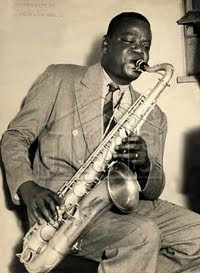Pixinguinha and Choro Day
 |
| Pixinguinha (1897-1973) |
Alfredo da Rocha Vianna Filho (1897-1973), better known as
Pixinguinha, was a choro composer, arranger, flutist and saxophonist born
in Rio de Janeiro. Through the legacy of the pioneering choro composers of the 19th century and of the Afro-Brazilian tradition, Pixinguinha produced some of
the most important choro works of all time. His work as a composer, bandleader, flutist/reedplayer and
originator of the choro genre is of invaluable importance, historically and from a musical point of view. The work of
Pixinguinha may be considered important at the same level as the work of initial American jazz composers like
Duke Ellington - both helped shaping a musical form that had
success nationally and internationally.
The name and legacy of Pixinguinha is kept well alive in Brazil, in September 2000 President Fernando Henrique
Cardoso signed an official document to announce April 23th the National Day of
Choro in Brazil in honor of Pixinguinha. Every year since then choro has been celebrated officially on
the 23th of April through countless events in Brazil and around the world where Brasilian culture is a part of the
local community. Let's follow this tradition and celebrate the day by playing some choro music by Pixinguinha.
.jpg) |
| Os Oito Batutas |
Pixinguinha demonstrated ability on both flute and cavaquinho as a kid and started composing at an early age. By
the age of 14, he had composed his first choro, 'Lata de leite', and was already an accomplished flute player. In
1913, he made his first choro recordings, and by the time he was 15, he was playing professionally - at 18 he was
one of the most popular musicians and choro composers in Rio de Janeiro. In 1919, Pixinguinha formed the legendary
Os Oito Batutas (- meaning 'The Eight Remarkable Players' in English).
The group consisted of flute (- and later saxophone), guitars, cavaquinho, bandolim, bandola, pandeiro and assorted
percussion. - Led by Pixinguinha, Oito Batutas was formed to entertain the audience of Rio's prestigious Cinema
Palais in its foyer. Opening on April 7, 1919, the group was a success from its debut. The Carioca élite were taken
by surprise by the repertory of maxixes, sertanejo songs, batuques, cateretês, and choros. In 1920, the group
performed for the King of Belgium and in the next year they toured Brazil. Returning to Rio, they went to play at
the luxurious Assírio Club, accompanying the dancing duo Duque & Gaby. In January 1922, the group departed for
Paris, France, financed by millionaire Arnaldo Guinle. Introduced as Les Batutas at the Scherazade club, they
performed there for six months with great success. - Also in 1922, they left for Argentina, performing at the
Empire Theater (Buenos Aires) and recorded 20 sides for the Argentinean Victor label. Upon their return to Brazil
in 1923, they diminished their performances until they soon dissolved the group. - Among the recorded material by
Oito Batutas there was a composotion by initial guitar choro originator, João
Pernambuco, who was a member of the group for some time - here his choro 'Graúna' is performed by
Pixinguinha on flute accompanied by the Batutas
In the late 1920s, Pixinguinha was hired by RCA Victor to lead the Orquestra Victor Brasileira, and during his
tenure there he refined his skills as an arranger. It was common for choro musicians at the time to improvise their
parts based on a simple piano score, but the growing demand for radio music from large ensembles required fully
realized written scores for every instrument, and Pixinguinha was one of the few composers with this skill. It was
in this role that he created some of his most famous compositions, i.e. 'Lamentos' and 'Carinhoso' - Here is
inserted the original recording of 'Lamentos' from 1928
 |
| Benedito Lacerda (flute), Pixinguinha (saxophone) |
In 1939, Pixinguinha left Victor to join flautist Benedito
Lacerda's band, where he took up the tenor saxophone as his primary instrument and continued to
compose music for the group. Lacerda's band was a conjunto regional, the name given to in-house bands hired by
radio stations to perform music and accompany singers, often live in front of a studio audience. It was with
Lacerda that Pixinguinha began another fertile period of composing and recording. Due to economic troubles as the
regionais fell out of favor in the late 40s, Pixinguinha had to sell the rights to his compositions to Benedito
Lacerda, who for this appears a co-composer of many of Pixinguinha's tunes, even those composed while Lacerda was
still a boy. In the recordings with Lacerda, Pixinguinha plays secondary parts on the saxophone while Lacerda plays
the flute part on tunes that Pixinguinha originally wrote on that instrument. - Here's an example of the co-work
between Pixinguinha and Lacerda, the recording of Pixinguinha's choro 'Vou vivendo' (1946)
By the mid 1950s, changing tastes and the emerging popularity of samba and American jazz in Brazil led to the
decline of the choro regional as other genres became dominant on the radio. Pixinguinha spent his time in
retirement, appearing in public only on rare occasions. - Here's a rare film from this period showing Pixinguiha
and his conjunto playing his famous choro 'Um a zero' - enjoy!
Pixinguinha's music continues to inspire and challenge musicians of all kind to play their version of his famous
compositions, here's a new uploaded video showing the harmonicaplayer Vitor
Lopes performing 'Lamentos' as a solo piece to end this small celebration of Pixinguinha and Choro
Day
---
Jo




0 Comments:
Post a Comment
<< Home